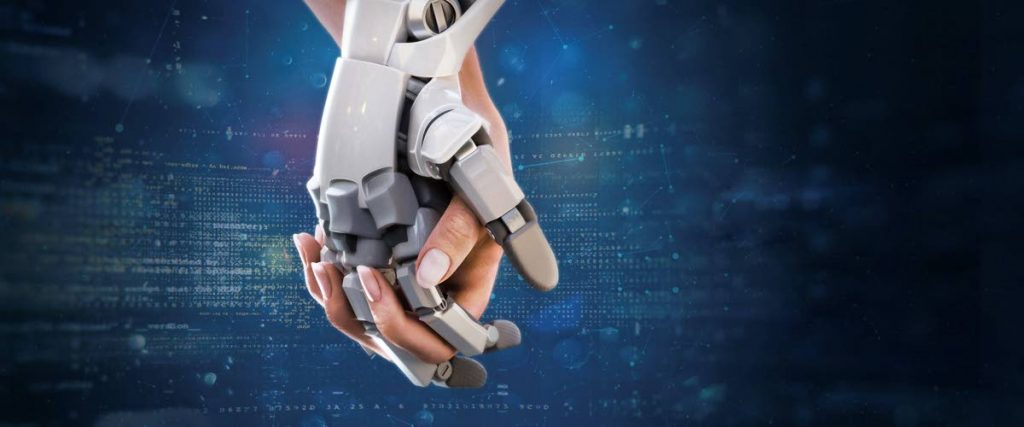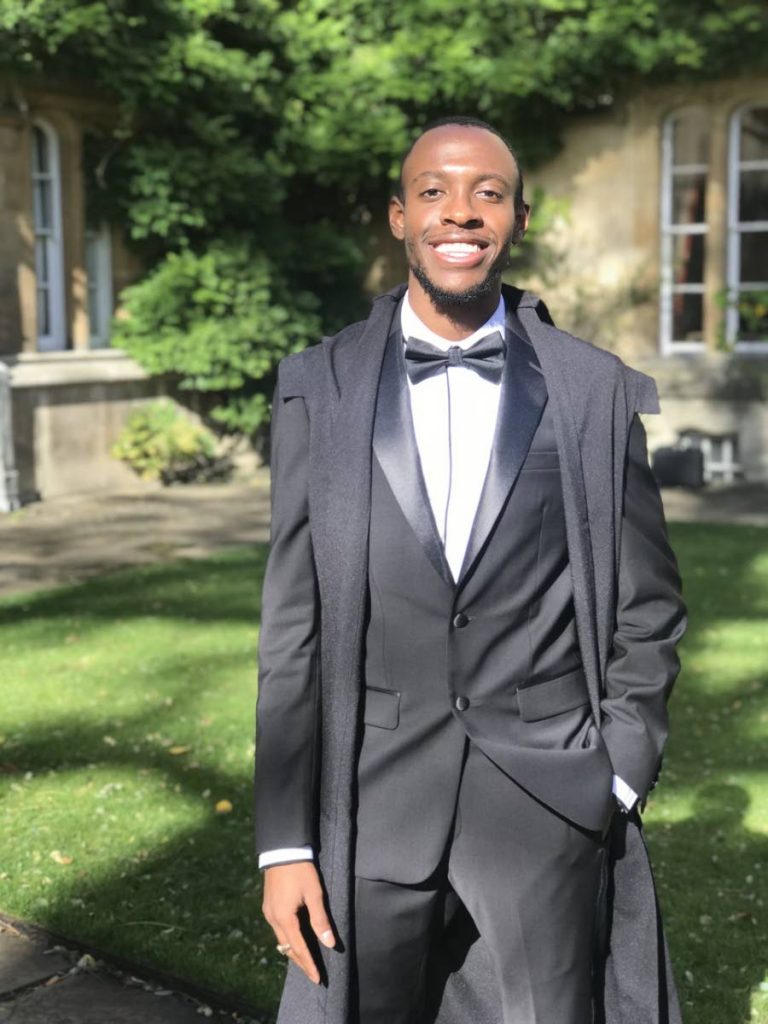For good or ill this Trini is ushering in a new age of AI

kmmpub@gmail.com
Mandela Patrick is terrifying. This south Trinidad born and raised software engineer has been working on transformative artificial intelligence research. But in the wrong hands, his work could help usher in a new age of totalitarian surveillance.
He told me that he worries about the extent to which his identity is tied up in his institutional credentials, so I’ll go ahead and fuel that worry by rattling them off: degrees from Harvard and Oxford, internships at Goldman Sachs, Facebook and Instagram, a stint on the TT national squash team, junior calypso monarch and research at Oxford and consulting for Facebook and Mosaic Ventures, to name a few.
Why don’t we start with your upbringing in TT?
I grew up in a household that always sort of, let’s say, uh well rounded. My dad and my siblings were multi-talented, from music and sport.
I grew up singing calypso. My dad (Raymond Patrick, known as Patches) is a big calypsonian himself. I’ve always been interested in how to make a positive impact on people’s lives at scale and I think music is one of the biggest ways that can do that. Calypso can articulate the grievances, the concerns, and the strife of the common man.
Calypso was my first introduction to problem solving – being able to talk about people’s problems.
But there was also an entrepreneurial side of it.
When I was growing up, I didn’t have as much disposable income without asking my parents so I would force my brother to play piano or Christmas carols and sell to the neighbours!
Child labour! So, Mandela, would you say you have a strain of activism in you?
Activism has a very specific image; that word itself has a certain image that I wouldn’t describe myself with. I’ve been given the name Mandela so there’s a certain awareness of the need to fight for people. I want to help people at scale.
I don’t know if there was any particular moment, or experience that gave me my drive, but I’ve always been fascinated with this idea of legacy, so impact that outlives you. His (Nelson Mandela’s) legacy outlived him. So, I always had that some sort of subconscious sense.
I can imagine – what if I was named Gandhi! So how did you become interested in technology as a vehicle for change?

As I was growing up, new technologies were making a massive difference in my life and that’s when I first got a sense of how I could actually do that.
I was watching this show Jimmy Neutron, this cartoon character with a big head who was making computer games for other characters in the school.
I begged my dad to order this book (on computer gaming). It took about a month for it arrive. I remember being so impatient. I was about nine or ten.
I’ve always been sort of interested in mediums that connect with people, whether it’s sports or music people connect with that. When you think of people in sports, people worship these stars.
Games are a powerful medium to connect with people. When you think of mediums like Twitch (a video game live streaming platform) or Fortnite (a video game), in which (musician) Travis Scott was able to attract 45 million viewers for a live virtual concert.
Games for me – I used to play a lot of FIFA (a football game) growing up. Games, like music are an escape from the mundane. I started thinking, how can I help my friends enjoy a few minutes of escape?
I came up with a couple; it probably wasn’t that novel or new. I came up with this game that combined football with bowling. You kicked the football into pins.
Sport was a big part of your life from early on, right?
I was pretty set on potentially going to the US and to play squash on the highest level. A lot of Caribbean players have made a name for themselves.
My brother and my dad played squash; all good fun. But Harvard was the number one ranked college squash team; they trained more seriously.
You seem to have sailed through quite a lot. How did you maintain motivation without having gone through “the struggle”?
I was used to being the best in everything: I topped A-levels, Caribbean squash champion. And then going into Harvard I just wasn’t. As a walk-on, I was hovering around nine or ten. All of the best players from all of the top Squash teams were on there. I’m struggling to stay on court with these guys. Going from being the big fish in a small pond to not being that anymore.
I do still worry though about not fully being able to achieve my potential or fully take advantage of opportunities that I’ve had. I sometimes think, who are you without these institutions that you are part of?
Tell me about your most recent work on artificial intelligence.
As human beings we have a semantic understanding of the visual world. Even from pretty young, children can associate the word apple with the shape and texture of what an apple looks and feels like. We understand what a tree is. We learn how to map contexts to visual elements easily. Traditionally, how a lot of AI systems learnt is from a lot of direct or manual supervision. You tell them this picture is a cat or a dog. That is manual supervision. The problem with that is that you then get this bottleneck: these AI systems need more data, and you can’t label enough data for the model to be able to understand more.
What we’re looking at is how to predict the semantic concept in one modality from another: so as soon as you hear a “meow” you associate it with a cat. We do this by feeding the systems with data, so they learn an abstraction of which visual elements match others.
How can this be applied?
With regards to (social media) platforms like TikTok, people say that it seems that like TikTok just knows me. They can now get more engaging content. A lot of these systems can also be used in surveillance or security systems and can detect crime.
Are you worried that that can be misused, whether by totalitarian governments or attention hoarding corporations?
Surveillance is a double-edged sword. With any sort of technology, it can be broadly misused, but I think fundamentally the purest application of it is fundamentally positive for the world: you seeing more content that you find interesting. People take for granted just how valuable recommendation systems are, for example in connecting them to knowledge or content.
What applications do you see having an immediate impact?
For me, the most exciting application about these technologies is what you’re seeing in education, where sort of being able to make educational video content, and also being able to give that content in different languages is now much easier. They do a combination of machine translation plus dubbing, talking to you in Spanish for example, making education more accessible.
How do you make online content engaging, interesting and accessible to the large portion of the world who do not speak English?
You’re an athlete as well. What about sport?
The applications are endless; it is an exciting time. One of my former colleagues on the Harvard team had one of these wearables called Whoop. It tells you for example did you recover well after your workout, are you in an optimal state to train today?
What problems would you look at if you were to start a company?
Entrepreneurship is one of the most powerful ways to leave your legacy. One of the problems that gets me excited is in education. Education is probably one of the most meaningful ways to accelerate change in a community and a country. Talent is sort of widely distributed, opportunity is not. Even in a local (TT) context you have these prestige schools and I’d look at using technology to break down these barriers.
On a broader sense, how can we leverage large-scale data from a wide variety of people and contexts to make things accessible?
What advice do you have for our readers?
Surround yourself with smart people, people smarter than you. Even in high school I started a study group to prepare for CAPE and we all got open scholarships. Three of us came top in the Caribbean. A lot of my achievements have been because of the people I’ve been fortunate to have around me.
Kiran Mathur Mohammed is a social entrepreneur, economist and businessman. He is a former banker, and a graduate of the University of Edinburgh


Comments
"For good or ill this Trini is ushering in a new age of AI"